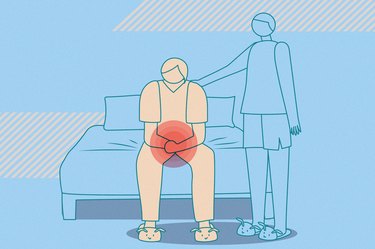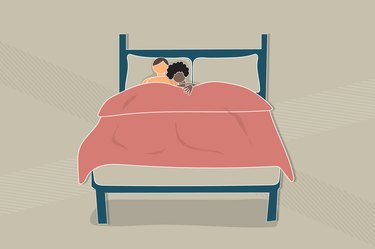
Pain during sex is common, but it's definitely not normal. So if being intimate is making you physically uncomfortable, it's time to get help.
"Sex is for procreation but also for pleasure, and that pleasure is harder to achieve if sex is painful," says Maria Sophocles, MD, board-certified ob-gyn and Medical Director of Women's Healthcare of Princeton in Princeton, New Jersey.
Video of the Day
Video of the Day
Figuring out the culprit behind your discomfort can take some detective work, but it's worth the effort, she adds. Here's a look at some of the most common causes of pain during sex, plus what you can do to make things feel good again.
1. You Have an STI
Sexually transmitted infections including chlamydia and gonorrhea can cause pain or burning during sex, according to the American Academy of Family Physicians.
Herpes, too, can lead to small blisters on the penis or vaginal area that can burn or feel sore.
Fix it: See your doctor if you think that you might have an STI. Infections like chlamydia and gonorrhea may require antibiotics. And while there's no cure for herpes, there are medications (and some other herpes remedies) that can make your symptoms more manageable.
2. You Have Another Type of Infection
Yeast infections and other vaginal infections, like vaginitis, can cause pain during sex along with itching, burning and an increase in discharge.
Urinary tract infections or even eczema in the genital area can cause discomfort too, per the Mayo Clinic.
Fix it: Again, it's worth seeing your doctor if you think an infection is making sex painful. You and your provider can discuss your symptoms to determine the diagnosis and decide on the best treatment option, like antibiotics or an antifungal.
3. You're Having Trouble Getting Aroused
Feelings of depression or anxiety, stress, fear of intimacy or even worries over how you look can all make it harder to get aroused. If you have a vagina, that can make it harder to become adequately lubricated, says Dr. Sophocles, which can make sex uncomfortable.
Fix it: Addressing emotional issues related to arousal can take time. Talking with your partner about what's on your mind is a good first step; in some cases, you might also consider talking with a mental health professional, according to the Cleveland Clinic.
4. You're Going Through Menopause
Painful sex during menopause is, unfortunately, a common problem.
"When our estrogen levels fall with menopause, most women will experience some dryness, since estrogen is what helps keep our vaginas moist," explains Mary Jane Minkin, MD, clinical professor of obstetrics, gynecology, and reproductive sciences at Yale University School of Medicine.
The lack of natural lubrication leads to vaginal tissues becoming thinner and less flexible, which can result in pain and burning during sex.
Fix it: Dr. Minkin recommends starting with an over-the-counter vaginal moisturizer such as Replens Long Lasting Vaginal Moisturizer ($12.98, Walmart.com), two to three times a week to help keep vaginal tissues better hydrated.
Adding in a lubricant before sex, such as Trojan H2O Closer ($9.98, Amazon), helps too.
If OTC options aren't cutting it, you and your doctor can also discuss hormonal treatments like topical estrogen.
5. You Recently Gave Birth or Are Breastfeeding
Painful sex that develops after childbirth or while breastfeeding stems from hormone shifts too. "After childbirth, there is a drop in ovarian estrogen production, which deprives the vaginal tissue of its ability to make moisture," Dr. Sophocles says.
Injury or trauma during labor and delivery, like an episiotomy, can also potentially lead to sexual discomfort, per the Mayo Clinic.
Fix it: Postpartum dryness will typically clear up on its own as your hormones even back out. In the meantime, be open with your partner about your needs, and make plenty of time for foreplay. "It's really important for good lubrication," Dr. Minkin says.
Also, don't be afraid to reach for a lubricant. "Don't be ashamed to use one. They're fun and for anyone, anytime," Dr. Sophocles says.
Practicing self-care during those early postpartum days can help you feel your best overall, too.
6. You Have a Gynecologic Condition
Conditions like endometriosis, pelvic inflammatory disease, uterine fibroids, ovarian cysts and pelvic floor dysfunction can all make sex uncomfortable, according to the Mayo Clinic. "The pain usually occurs with deep penetration, not upon insertion at the beginning of intercourse," Dr. Minkin explains.
Fix it: If your pain is caused by an underlying gynecologic condition, it will typically require treatment in order to feel better. Start by sharing your symptoms with your doctor to get the right diagnosis and discuss next steps.
7. You're Taking a New Medication
Antidepressants, high blood pressure meds, sedatives, antihistamines and birth control pills can make it harder to get aroused. That, in turn, can reduce lubrication and make sex dry and uncomfortable, the Mayo Clinic notes.
Fix it: Let your doctor know if you suspect a new prescription is zapping your interest in sex or making it uncomfortable. They may recommend giving your body time to adjust, spending more time on foreplay or using a lubricant, but if those things aren't helpful, you can also talk about making changes to your meds.
8. You Have Prostatitis
Inflammation of the prostate caused by a bacterial infection or an abnormal immune system response, prostatitis can make ejaculation uncomfortable. It can cause other symptoms too, like chronic pelvic pain, pain during or after urination or frequent urination, according to the National Institute of Diabetes and Digestive and Kidney Diseases (NIDDK).
Fix it: Contact your doctor if you're experiencing symptoms of prostatitis. While no one treatment works for every person, antibiotics, anti-inflammatories, muscle relaxants and other medications can help clear up the problem and reduce discomfort, the NIDDK notes.
9. You Have Vaginismus
Vaginismus is when the vaginal muscles involuntarily spasm any time penetration is attempted, according to the Cleveland Clinic. This can make sex painful, but it can also happen during pelvic exams or when inserting a tampon.
The exact cause of vaginismus isn't clear, but it may happen when the person has a fear of or negative feelings about sex. Other risk factors include having an anxiety disorder and a history of surgery or childbirth injuries such as vaginal tears.
Fix it: Talk to your doctor if you think you have vaginismus. Kegels and vaginal dilators can help relax the muscles in this area, per the Cleveland Clinic, and mental health treatment such as cognitive behavioral therapy can help you address the root cause of the spasms.
When to See a Doctor About Pain During Sex
Pain that's negatively affecting your sex life is typically caused by an underlying problem, like an infection, a gynecologic condition or hormonal changes. Seeing your doctor to get to the root cause can help make sex more comfortable, and in some cases, could help protect your health in other ways.
It's best to talk about your symptoms directly if you can. But if you're having trouble getting the conversation started, try saying something like, "I am sexually active but sometimes it is uncomfortable," Dr. Sophocles recommends. From there, your provider can ask more specific questions about what you're feeling, so you can figure out the best solution.
- American Academy of Family Physicians: "Common Sexually Transmitted Infections (STIs)"
- Mayo Clinic: "Painful intercourse (dyspareunia)"
- Cleveland Clinic: "Sexual Dysfunction"
- National Institute of Diabetes and Digestive and Kidney Diseases: "Prostatitis: Inflammation of the Prostate"
- Cleveland Clinic: "Vaginismus"
Was this article helpful?
150 Characters Max
0/150
Thank you for sharing!
Thank you for your feedback!
Is this an emergency? If you are experiencing serious medical symptoms, please see the National Library of Medicine’s list of signs you need emergency medical attention or call 911.


